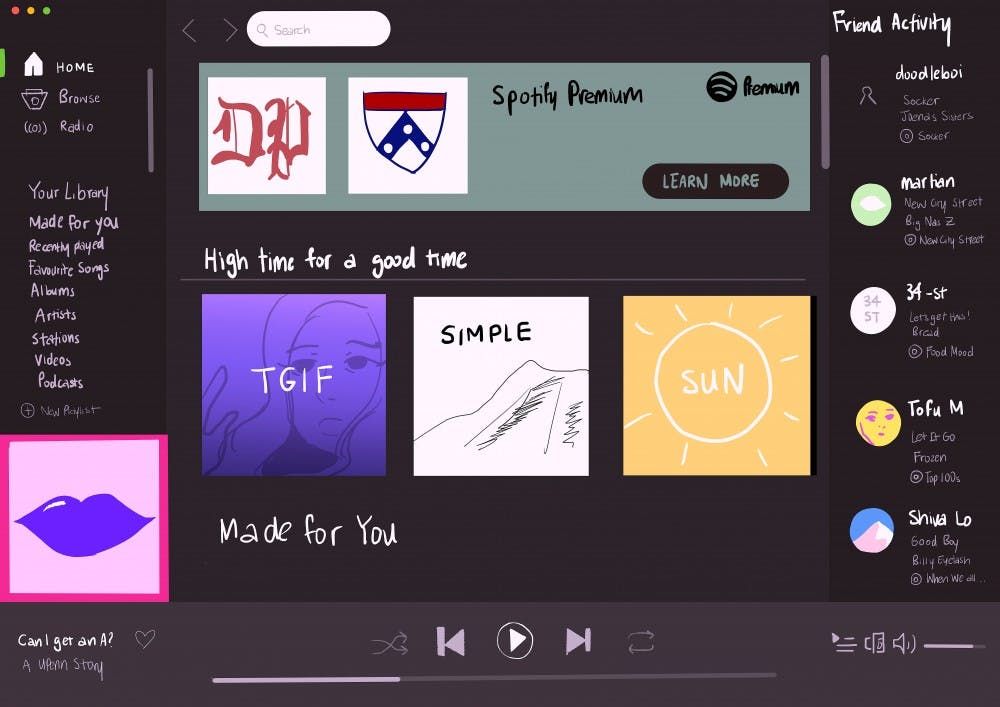To invoke a little Forrest Gump, listening to music should be like a box of chocolates—you should never know what you're going to get. A twist of a radio dial or a scroll down a curated Spotify playlist should bring discovery, unearthing new favorite artists, forgotten throwbacks, and genres so obscure you question their existence. My point: the social media age has made the music industry, in theory, an all–inclusive party. It takes mere minutes to become a Soundcloud rapper, and even less time for fans to find the song, share it with their friends, and make fun of you for being a Soundcloud rapper. Nowadays, virtually anyone can make music, and anyone can listen.
With talks of a merger between Alphabet, Google's parent company, and Universal Music Group floating around, would this union ruin a musical free–for–all? The answer—it's complicated.
Billed as what could possibly be the music industry’s biggest merger to date, Google is looking to buy half of Universal Music Group, which owns the world's biggest recorded music catalog. UMG represents a veritable rainbow of colorful artists, ranging from major indie players like The 1975, to mainstream mainstays like Ariana Grande, to icons like the Beatles. In other words, a music catalog spanning the advent of the Walkman, the iPod shuffle, and streaming platform is up for grabs—and its acquisition could turn Google Music and YouTube into sonic encyclopedias.
But this is where things get interesting. Alphabet also owns YouTube, which grants an average of 1.6 billion users per month virtually unrestricted access to “free music.” Currently, it has the biggest market share of any streaming service, with an audience 8 times larger than that of Spotify. On its face, this merger changes little for consumers. You're still going use YouTube for a mixture of purposeful and accidental listening. Nothing will prevent you from searching for “Sucker” by the Jonas Brothers, clicking past the pesky little ad that plays before the video, and then getting distracted by something wholly undiscovered in your “Recommended” queue. For casual listeners, business continues as usual.
If anything, YouTube users will have access to more free music, thanks to UMG's seemingly endless catalog. Songs formerly barred from the service due to UMG’s strict adherence to copyright laws are fair game, meaning forgotten or unreleased Prince and Beatles bangers could be at our fingertips. In an anachronistic era, where Woodstock is suddenly cool again and record players decorate dorm rooms, this is exciting. A YouTube–UMG merger could create the “new throwback,” or an old song with a second life.
However, this merger could also perpetuate an industry–wide norm where emerging indie artists are crowded out of the music industry, swapping guitars for desk jobs, and their dreams for financial security.
Royalties, for the independent artist, are a new, yet constant, issue. Dubbed the “value gap,” independent artists are often paid far less per stream than they deserve based on the production value of a song. In 2018, Spotify raised its royalty wages, paying artists between $.0084 and $.006 per stream, which was only after Taylor Swift’s groundbreaking deal with the service to either increase royalties or risk losing her music forever. In other words, artists make less than a cent per stream, and approximately $7,000 for 1 million streams. To an independent artist, 1 million streams offer a whiff of success, providing the kind of exponential exposure formerly characteristic of an American Idol win. However, they don't offer a livable wage. For one adult in Philadelphia, the living wage (pre–tax of course) is $26,290 -- over triple what is made from a really successful year on the prototypical streaming service. This disparity drives independent musicians to dedicate less and less time towards their passion, taking day jobs that turn into full–time gigs all in favor of financial autonomy and stability.
YouTube pays artists as low $.00074 a stream. By merging with the company's parent, UMG is endorsing these crowding out practices, especially as they face mounting legal pushback. Recently, the European Union proposed Article 13, a piece of copyright legislation that doubles as an ultimatum to the music industry: streaming services, like YouTube, can either pay artists more or get dragged to court on a routine basis, bogging down their businesses with astronomical legal fees. If this passes, YouTube would face a significant drop in profit margins as they adjust to a more ethical business model, which is why they want to circumnavigate as much of the law as possible.
By acquiring Universal Music Group, YouTube would remove one of the biggest players in the enforcement of Article 13 — a behemoth music corporation. Under Google’s umbrella, UMG grants YouTube all the copyrighted distribution freedom possible, implicitly agreeing with the streaming service's unfair royalty wages. YouTube will still underpay, you'll still listen to whatever you want, and independent artists will still have to run an ugly cost-benefit analysis on their dreams, ultimately always coming up short on benefits.
Of course, taste is subjective, but no one can dispute the effort that goes into producing a fire mixtape or power ballad — there's the writing, and the composing, and the recording, and the mixing, a process so complicated even the most involved explanation is oversimplified. Artists should be paid more for all that labor, but this merger endorses a music industry wide norm that constricts the offerings of radio stations and streaming services alike. As more and more independent artists forgo the grind, airwaves are homogenized, churning out only songs by artists that can sustain themselves while earning less than a cent per stream. In other words, this means “Sicko Mode” indefinitely on repeat.
The bottom line? A Google–Universal Music Group merger turns the music industry from an all–inclusive one to a frat party, with Google working the door.







